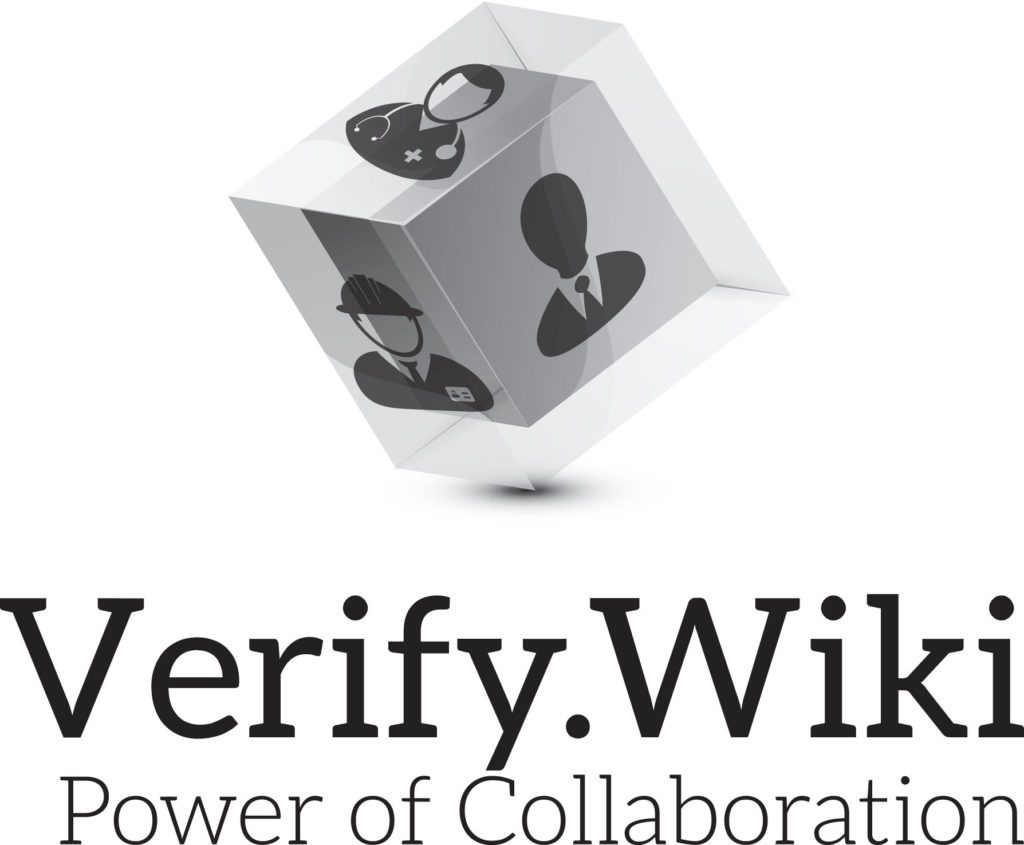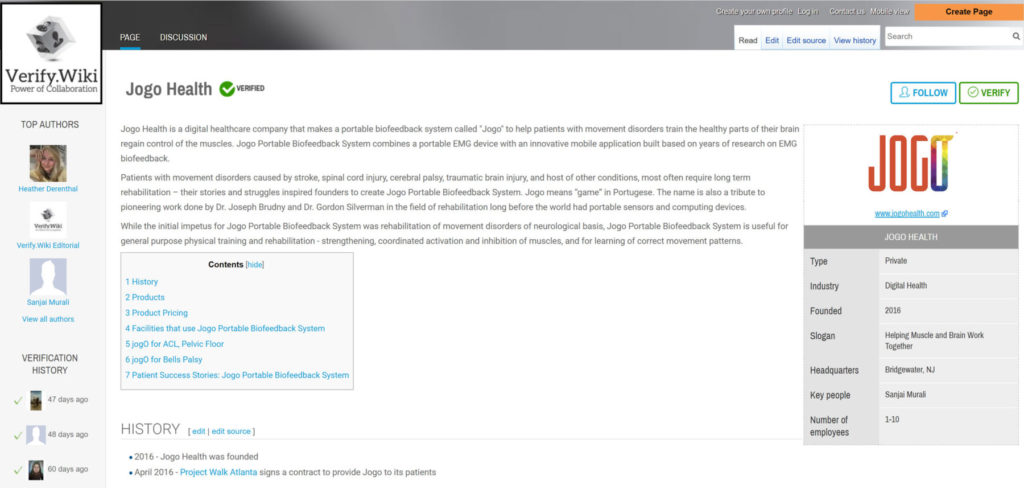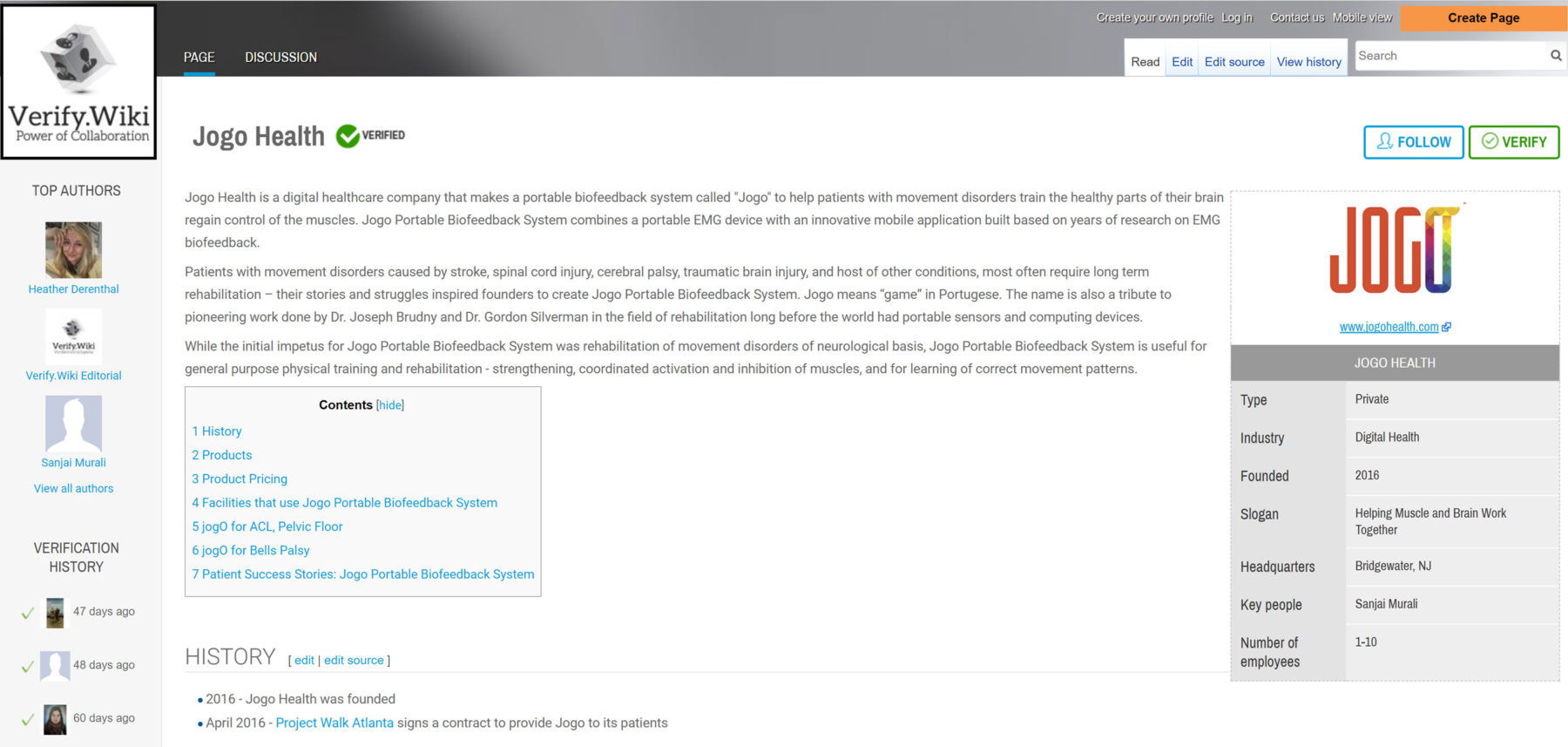Not only is Wikipedia one of the most popular wikis on the web, it is also the place where the majority of health-information seekers turn to begin their search. That is not great news for brands, as the information there is not always accurate, and, for the most part, brands are not welcome. That is not the case at Verify.Wiki. In fact, at this new combination of a wiki and social network, brands are very much welcome. After all, they are the reason CEO Heather Derenthal and the rest of the co-founders started the company in the first place.
 Having all come from pharma, they were aware of the popularity and influence that wikis have on both patients and HCPs, but also the need to remain compliant with FDA guidelines, while ensuring brands maintain a level of control over content. That is why Verify.Wiki offers an opportunity that brands cannot find elsewhere: Alignment with patient and HCP preferences for wiki-style content, the ability to boost SEO, and potential 40% to 60% increases in content comprehension and retention versus websites. PM360 spoke to Derenthal about what makes this platform so unique, how pharma companies can benefit, and what to keep an eye out for down the road.
Having all come from pharma, they were aware of the popularity and influence that wikis have on both patients and HCPs, but also the need to remain compliant with FDA guidelines, while ensuring brands maintain a level of control over content. That is why Verify.Wiki offers an opportunity that brands cannot find elsewhere: Alignment with patient and HCP preferences for wiki-style content, the ability to boost SEO, and potential 40% to 60% increases in content comprehension and retention versus websites. PM360 spoke to Derenthal about what makes this platform so unique, how pharma companies can benefit, and what to keep an eye out for down the road.
 PM360: What lead you to the idea for Verify.Wiki?
PM360: What lead you to the idea for Verify.Wiki?
Heather Derenthal: It started with a statistic from the IMS Institute for Healthcare Informatics (IIHI) that showed 53% of all physicians, patients, and caregivers prefer to start their online information-seeking journey using Wikipedia. Furthermore, IIHI found that number went up to 71% in the Millennial audience. That was significant because a 2015 study by the Journal of American Pharmacists Association found that up to 65% of the drug information on Wikipedia is inaccurate and hard for brands to correct.
Another critical piece of data: IIHI showed a direct correlation between Wikipedia visits and product sales. So, they’re definitely relational, and the quality of the information on Wikipedia—depending on its accuracy—can either help or hurt a brand. So, we wanted to build a transparent, collaborative environment in which everybody’s viewpoint is welcome—as long as they’re clearly identified. We believe this is going to generate much more accurate, believable, and reliable information in a format already preferred by HCPs and patients.
How exactly does Verify.Wiki work for brands?
Brands create articles and decide on the level of content protection they desire. Verify.Wiki pages are then linked internally to other brand-critical pages, as well as externally to existing digital assets in the brand’s ecosystem. This creates a comprehensive brand encyclopedia and has proven to have a powerful effect on organic search rankings.
Can those brand pages be edited by anyone?
We offer different levels of content protection based on the particular client’s use case. Let’s say, Opdivo, for example, wanted to create a Verify.Wiki brand page. They would put the content up for everyone to see, but through role-based permissioning they can control who can edit it.
Does restricted access to content turn off visitors to the site?
Actually, no. Unlike other social channels, expectation of participation on a wiki is not the main appeal. Only 1% of wiki visitors have a desire to edit the content. The draw of wikis is the perceived transparency and neutrality of information.
You also offer a free version and a subscription-based model. Can you explain the difference?
Public content is accessible and free for anyone to read, edit, or add new pages. Companies are paying a subscription fee to have control over their content, and we provide strategic guidance on incorporating Verify.Wiki pages into their existing ecosystem.
What does Verify.Wiki offer companies that they can’t get through their own websites or social media presence?
What makes us unique is that we combine a wiki with social networking for content distribution and verification. We’re not trying to replace anything in the digital ecosystem. Instead, we are able to add a trust boost to existing content, because people love and are familiar with the format of wikis. Wikis, by nature, are also extremely search-positive and the combination of the two is a 1+1 = 3 effect on organic rankings. We also see significant increases in engagement. We’ve seen content that was taken directly from a brand’s website, placed on Verify.Wiki, and watched the engagement levels on the exact same content increase in the 40% to 60% range.
What are your future plans for Verify.Wiki moving forward?
As we secure additional funding to grow, we have plans to offer advertising in our newsfeed as well as behavioral insights data. We also plan to launch an online opinion leader identification and engagement program with a leading analytics and data services provider later this year.
Three Benefits of Verify.Wiki
In a short time, Verify.Wiki has already experienced success in helping brands in three key areas.
1. Improved Content ROI
Verify.Wiki extracted content from two national consumer brands’ existing websites and placed it on branded pages on Verify.Wiki’s platform. Derenthal says that not only did time with content on Verify.Wiki improve, but folks who experienced the Verify.Wiki content returned to the brand websites and were five to seven times more likely to download materials, place an order, or opt-in to the client’s CRM program.
2. Online Opinion Leader Development
Verify.Wiki recently entered into a partnership with a leading healthcare data analytics provider to create a turnkey solution for online opinion leader identification, communication, and development. “By providing knowledge of what is being said and by who, we seek to improve the quality and transparency of healthcare information available to HCPs and patients,” Derenthal says. “Misinformation on the Internet results in delayed treatment, wrong treatment, and incorrect use of treatments, costing pharma and payers billions of dollars each year.”
3. Improved Organic Search Rankings
 Despite having multiple digital channels in play, Verify.Wiki client, Jogo Health, was being outranked by a similarly named product in the gaming industry, relegating their digital properties to page three of search results. Within two weeks of launching internally and externally linked Verify.Wiki pages, searches for “JogoHealth” and “Jogo Health” attained the No. 1 result on Google SERP, and the rankings of their own branded properties made the first page.
Despite having multiple digital channels in play, Verify.Wiki client, Jogo Health, was being outranked by a similarly named product in the gaming industry, relegating their digital properties to page three of search results. Within two weeks of launching internally and externally linked Verify.Wiki pages, searches for “JogoHealth” and “Jogo Health” attained the No. 1 result on Google SERP, and the rankings of their own branded properties made the first page.






